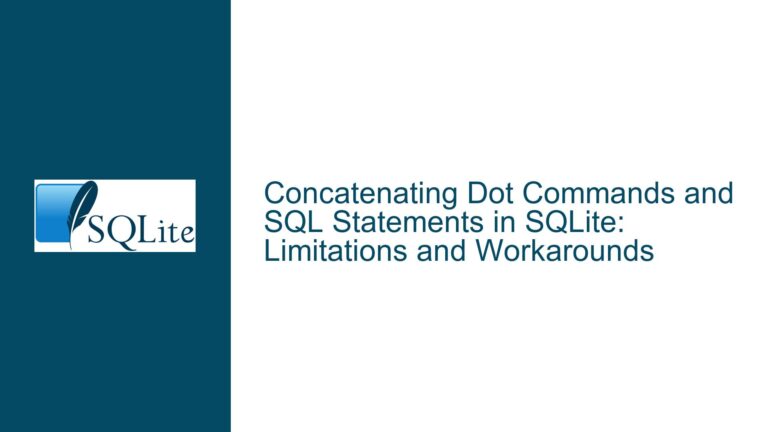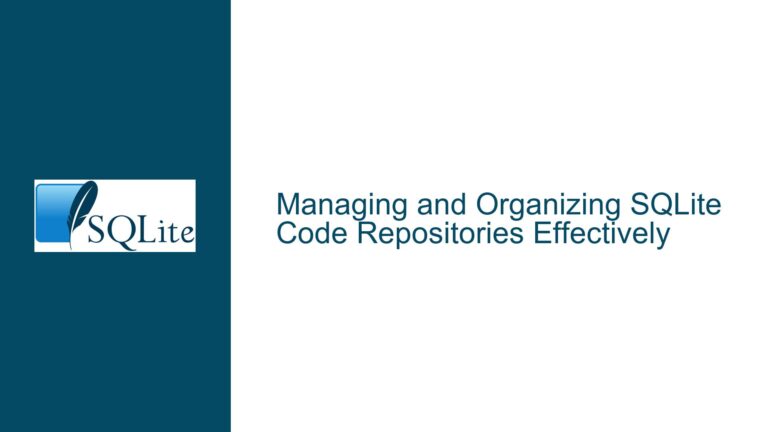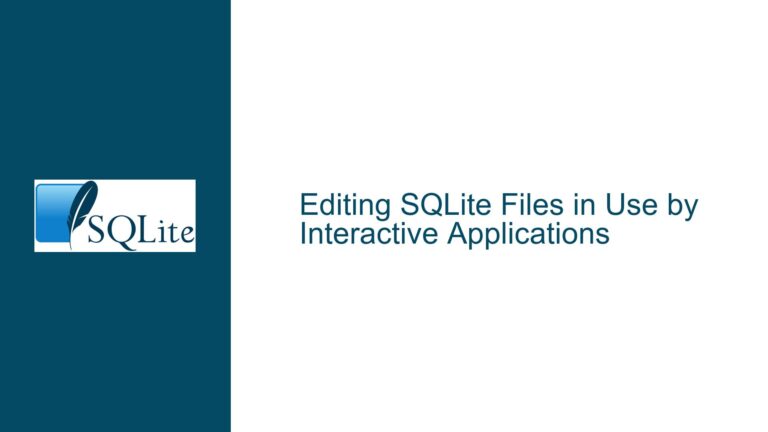Discrepancies in SQLITE_EXPERIMENTAL Markers and Version Documentation in SQLite Headers
Inconsistent Use of SQLITE_EXPERIMENTAL Macros and Version Documentation Errors
Issue Overview
The SQLITE_EXPERIMENTAL macro in SQLite’s sqlite3.h header file is intended to flag APIs as experimental, signaling that their behavior or signatures might change in future releases. However, inconsistencies have been observed in how this macro is applied to certain functions, as well as discrepancies in version documentation within the sqlite3ext.h header. These issues create ambiguity for developers relying on SQLite’s API stability guarantees and accurate version history annotations.
Key Observations:
Stale
SQLITE_EXPERIMENTALMarkers:- The
sqlite3_vtab_collationfunction has retained theSQLITE_EXPERIMENTALmacro since its introduction in SQLite 3.22.0 (2018). Despite being unchanged for four years, there is no indication in official documentation or release notes that it remains experimental. - The
sqlite3_snapshotfamily of functions (e.g.,sqlite3_snapshot_get,sqlite3_snapshot_open) initially carried explicit experimental warnings in their documentation comments. These warnings were removed in SQLite 3.25.0 (2018), but theSQLITE_EXPERIMENTALmacro persists in their declarations.
- The
Missing
SQLITE_EXPERIMENTALfor Documented Experimental APIs:- The
sqlite3_rebaserAPIs are explicitly labeled as experimental in online documentation, with warnings stating they are "subject to change without notice." However, these functions lack theSQLITE_EXPERIMENTALmacro in their declarations.
- The
Incorrect Version Annotations in
sqlite3ext.h:- The
sqlite3_api_routinesstructure insqlite3ext.hcontains fields (vtab_collation,vtab_nochange,value_nochange) that were added in SQLite 3.22.0. The header’s inline comments erroneously state these fields were introduced in version 3.20.0. This misalignment creates confusion for developers extending SQLite via loadable extensions, as version compatibility depends on accurate historical annotations.
- The
Implications:
- Unclear API Stability: Developers may avoid using APIs marked
SQLITE_EXPERIMENTALunnecessarily or unknowingly rely on unmarked APIs that are explicitly experimental. - Version Compatibility Risks: Incorrect version comments in
sqlite3ext.hcould lead to incorrect assumptions about backward compatibility, causing extension modules to malfunction when built against older SQLite versions.
Root Causes of Marker and Documentation Inconsistencies
The discrepancies stem from a combination of oversight in macro updates, divergent documentation practices, and human error during codebase maintenance.
Lack of Macro Lifecycle Management:
SQLite’s development process does not enforce a strict policy for updating or removingSQLITE_EXPERIMENTALmarkers once an API stabilizes. Functions likesqlite3_vtab_collationandsqlite3_snapshotwere likely marked experimental during initial implementation but never reviewed for promotion to stable status.Decoupled Documentation and Code Annotations:
The SQLite website and manual are maintained separately from the codebase. Changes to experimental warnings in user-facing documentation (e.g., removing "** EXPERIMENTAL" lines forsqlite3_snapshot) are not automatically synchronized with theSQLITE_EXPERIMENTALmacros in header files.Copy-Paste Errors in Version Comments:
The incorrect "Version 3.20.0 and later" comment precedingvtab_nochangeinsqlite3_api_routineslikely originated from a copy-paste mistake when adding new fields. The adjacent macros (SQLITE_VTAB_COLLATION, etc.) correctly note version 3.22.0, suggesting inconsistent editing during code updates.Asymmetric Handling of Experimental Flags:
Thesqlite3_rebaserAPIs demonstrate that experimental status is sometimes communicated solely through documentation rather than code markers. This inconsistency reflects a lack of standardized criteria for labeling experimental APIs across the project.
Resolving Marker Inconsistencies and Documentation Errors
Step 1: Audit and Align SQLITE_EXPERIMENTAL Markers
Action: Cross-reference all APIs marked with SQLITE_EXPERIMENTAL against official documentation and release notes to determine their current stability status.
- For
sqlite3_vtab_collation:
Since this API has existed unchanged since 3.22.0 and lacks experimental warnings in documentation, remove theSQLITE_EXPERIMENTALmacro from its declaration. - For
sqlite3_snapshotFunctions:
Confirm with SQLite’s development team whether these functions are still considered experimental. If the documentation’s experimental warning was intentionally removed in 3.25.0, remove the macro. - For
sqlite3_rebaser:
Add theSQLITE_EXPERIMENTALmacro to these functions to align with their documented experimental status.
Verification:
- After modifying headers, rebuild SQLite and test compilation with/without
-DSQLITE_OMIT_EXPERIMENTAL(if implemented) to ensure experimental APIs are excluded as intended.
Step 2: Correct Version Annotations in sqlite3ext.h
Action: Edit the sqlite3_api_routines struct in sqlite3ext.h to reflect the correct introduction versions for vtab_nochange, value_nochange, and vtab_collation.
- Change the comment before
vtab_nochangefrom/* Version 3.20.0 and later */to/* Version 3.22.0 and later */.
Verification:
- Check historical SQLite releases (e.g., 3.21.0 and 3.22.0 source packages) to confirm the absence/presence of these fields.
Step 3: Propose SQLITE_OMIT_EXPERIMENTAL Compilation Flag
Action: Advocate for a new preprocessor flag (SQLITE_OMIT_EXPERIMENTAL) to exclude experimental APIs from the sqlite3.h header.
- Modify header guards for experimental APIs:
#ifndef SQLITE_OMIT_EXPERIMENTAL SQLITE_EXPERIMENTAL int sqlite3_snapshot_get(sqlite3*, const char*, sqlite3_snapshot**); #endif
Considerations:
- This flag would help developers enforce strict avoidance of unstable APIs in production code.
Step 4: Establish a Review Process for Experimental APIs
Action: Implement a policy requiring periodic review of SQLITE_EXPERIMENTAL markers.
- Tie API stability reviews to major release cycles (e.g., every 3 years for long-standing experimental APIs).
- Synchronize documentation updates with macro changes to ensure parity between code and user manuals.
Step 5: Submit Corrections to the SQLite Team
Action: File an official issue or patch via SQLite’s bug tracking system (SQLite Issue Tracker).
- Include specific code snippets and version comparisons to justify changes to
SQLITE_EXPERIMENTALmarkers andsqlite3ext.hcomments.
Example Patch for sqlite3ext.h:
--- a/sqlite3ext.h
+++ b/sqlite3ext.h
@@ -XXX,XX +XXX,XX @@
int (*value_subtype)(sqlite3_value*);
int (*result_subtype)(sqlite3_context*,unsigned int);
/* Version 3.20.0 and later */
- int (*vtab_nochange)(sqlite3_context*);
+ /* Version 3.22.0 and later */
+ int (*vtab_nochange)(sqlite3_context*);
int (*value_nochange)(sqlite3_value*);
const char *(*vtab_collation)(sqlite3_vtab*,int);
Step 6: Workarounds for Current Ambiguities
- For Developers:
- Assume APIs marked
SQLITE_EXPERIMENTALor documented as experimental are unstable, even if markers/documentation conflict. - Use version guards to conditionally compile code:
#if SQLITE_VERSION_NUMBER >= 3022000 && !defined(SQLITE_EXPERIMENTAL) /* Use sqlite3_vtab_collation */ #endif - Monitor the SQLite Changelog for updates to experimental APIs.
- Assume APIs marked
By addressing these issues systematically, developers can trust the accuracy of SQLite’s API markers and version documentation, reducing the risk of unexpected breaking changes. Collaboration with the SQLite development team is critical to institutionalize these fixes and prevent future discrepancies.






